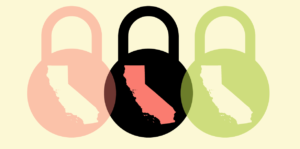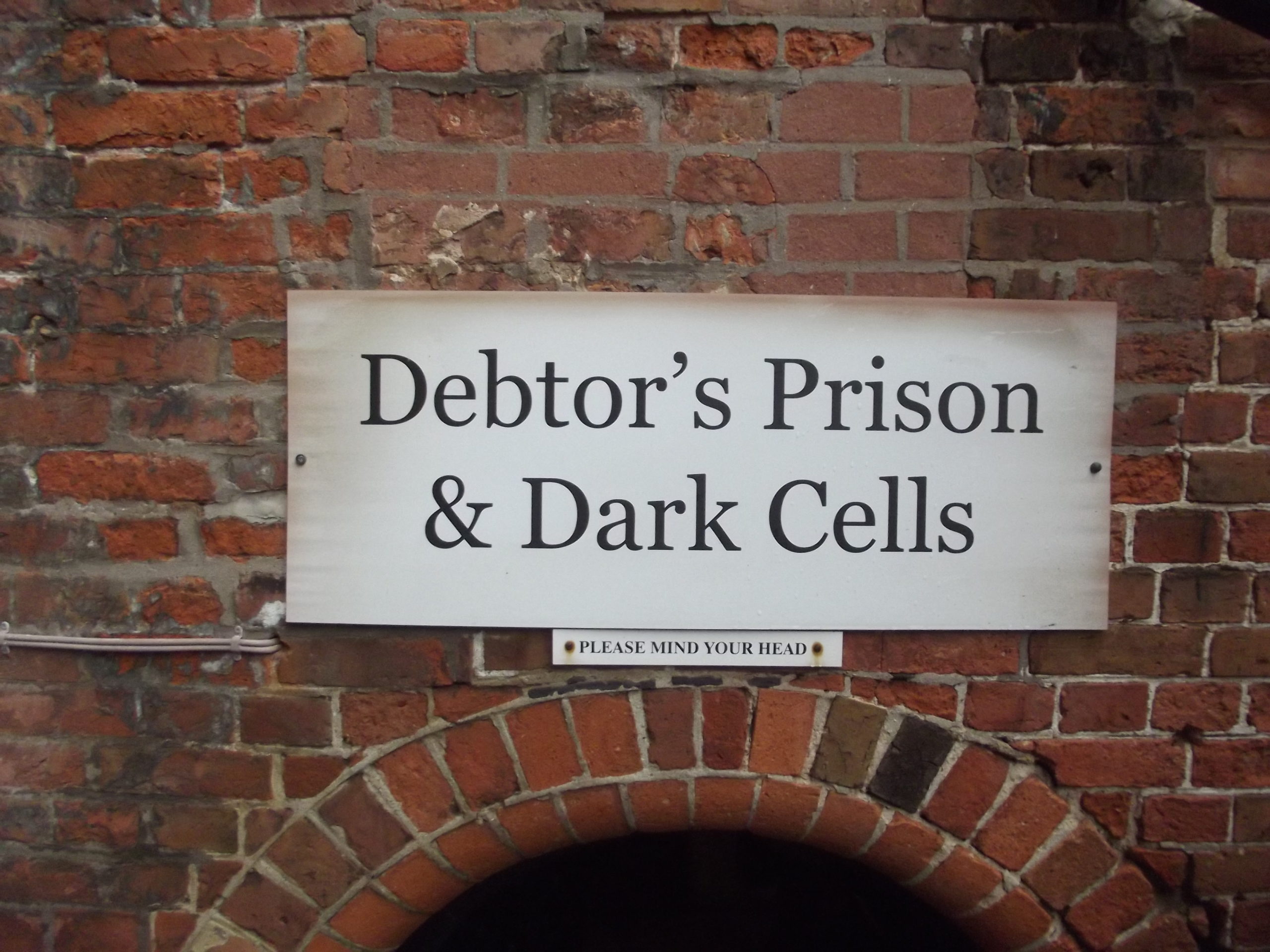Dealing with Modern-Day Debtors’ Prisons
By Kim M Reynolds and Seeta Peña Gangadharan
The ODB team has created a series of “tip sheets” that provide context and background about privacy issues faced by members of historically marginalized groups. The idea for Dealing with Modern-Day Debtors’ Prisons originated from questions raised in our interviews with Angelinxs, Charlotteans, and Detroiters.
America’s early history offers countless examples of unjust practices, some that persist today. One of these legacies is debtors’ prisons. From roughly the 1600s to the mid 1800s, most colonies and then states jailed people for overdue fees, loans, and borrows, sometimes for something as small as $0.06 cents.
While the U.S. government outlawed imprisonment of debtors in the mid-1800s, their structures remain in place, resulting in what can be considered modern day debtors’ prisons. Many Americans experience the costs of a predatory and poorly funded criminal justice system by either paying exorbitant court, ticket, prison, parole, or probation fines and fees (and potentially going into serious debt), or paying the price of time by spending time in jail for being unable to pay. Some people spend time in jail over the matter of very little money. In this case, the inability to pay the fines of a certain charge coupled with the processing fees that accompany the criminal justice system resulting in jail time is what many have dubbed as the modern-day debtors prison. This is also situated in the wealth stratification of the United States where racial, gender, and wage wealth gaps are prevailing and further maintained by the criminal justice system that targets minority groups.
In this post, we break down three states and their policies around unpaid fees as rising court costs to illuminate how the practice of modern day debtors prisons are targeting us in different ways.
North Carolina

North Carolina has become a central place of interest in highlighting the practice of modern-day debtors’ prisons. North Carolina features an array of fees triggered by contact with the criminal justice system, whether it be a one-time payment of a ticket, or fees for home ankle bracelet monitoring. These, like all fees, target and trap communities that are over-criminalized and struggling with poverty.
- In North Carolina, court fees, ticket fees, and jail fees all pay for the overhead of the North Carolina Justice department. North Carolina has the country’s second highest speeding ticket cost, coming in at $193 according to the ACLU.
- In the case of one going to court for a charge, if you are found unable to pay for legal representation, you are still assessed a $60 fee in order to go forwards with the trial, even if the judge deems you as too poor to pay your court fees or for a public defender.
- If you cannot pay bail on the charges of an upcoming trial, there is a $10 per day charge for remaining in prison.
- North Carolina residents face fees for sending evidence to crime labs ($600), for generally showing up in court ($150-205), for bail, for pretrial release, for community service, for the sheriff’s office, and the list goes on.
What is being done?
The ACLU is currently working to address and end this practice and is requesting stories and personal testimonies from North Carolina residents. If you have experience with criminal justice fines and fees, get in touch with them.
Michigan

Michigan residents face over-policing and fees related to driving and driver’s licenses. In 2003, the state introduced driver responsibility requirements in attempt to punish and curb driving violations. Conveniently, the state also profits: in 2016, Michigan collected $26 million from driving suspension charges alone. These policies have targeted and harmed Michigan residents who cannot keep up with payments that stack up.
- Driver responsibilities fees range from small to large and can also potentially land residents in prison serving time for nonviolent offenses and unpaid fees.
- Driving infractions and the charges associated with them are incredibly high and often stack up. Fees associated with the charge of driving without insurance can range from $100 to $2,000. If you can’t afford insurance, it’s unlikely you can afford these fees.
- According to a recent lawsuit, the years of 2015, 2016, and 2017 saw 100,000 Michigan residents lose their driver’s licenses altogether because they have been unable to pay fees and fines. But since people need driver’s licenses to get to work, Michigan residents face a serious cycle of debt, especially those who cannot pay the high fees in the immediate, facing compounded costs. In addition to all the fees that are associated with driving infractions, should your license be revoked or suspended, there is a $125 fee to getting one’s license back.
What is being done?
In March 2018, Michigan’s governor signed a bill into law that ends these driver responsibility fees, waives the outstanding debt of 625 million dollars belonging to a 300,000 Michigan residents, and temporary waives the reinstatement fee until 2019
California

As of 2017, California has the highest fees for infractions, tickets, and court costs out of all 50 states. Some states and counties charge baseline fees, set fees associated with a certain charge or court action. However, California’s exorbitant processing fees put the state at the top of the list for highest fees in the country.
In various areas in California inclusive of Fresno, San Diego, and Sacramento, Black and Brown drivers are more likely to be pulled over in a traffic stop, and as a result, more likely to face driving fines. Additionally, people are of color are more likely to be detained for no wrongdoing. This kind of targeting is not indicative of higher volumes of wrongdoing — but instead reveals racial bias and racism. In Bay Area counties, African Americans are four to six times more likely to be charged and arrested for unpaid fees. These people then face jail time if they’re unable to pay.
- While many states have baseline fees for certain violations, California’s fees associated with court costs or late payments are among the highest in the country. This turns a $100 ticket for running a red light into a $490 charge due to additional processing fees.
- Late fees can then accumulate. This $490 ticket can turn into $815 if it is not paid on time or you fail to appear in court on a certain day.
- In 2017 in Alameda County, African Americans make up 10% of the total population, but 40% of people booked into jail on a 40508(a) violation — inability to pay fees for traffic and vehicle infractions.
- Los Angeles has seen more people charged with petty offenses, like jaywalking, that result in incredibly high fees. In one 2015 case, a student faced $200 fine for jaywalking. This kind of charge has the potential of doubling in value for each unpaid month and could even lead to prison time in the fees go unpaid.
- 1 in 6 driver’s license suspensions are due to unpaid fees.
- San Francisco just abolished all of the criminal fees it imposed, and has decriminalized traffic offenses.
What is being done?
In June 2017, California repealed the policy of suspending or revoking driver’s license as punishment for being unable to pay fees. Additionally, the state has granted amnesty for all unpaid fees due on or before January 1, 2013, as a result of Senate Bill 405.
State-by-State Developments
In more cases than not, states put the burden on individuals to pay for their own arrest and incarceration. According to a 2014 state-by-state survey, NPR reports that:
- In at least 43 states and the District of Columbia, defendants can be billed for a public defender — despite the constitutional guarantee that everyone has a right to a lawyer.
- In at least 41 states, inmates can be charged room and board for jail and prison stays. Incarcerated people are generally poor to begin with, worsening income inequality.
- In at least 44 states, offenders can get billed for their own probation and parole supervision.
- In all states except Hawaii, and the District of Columbia, defendants and offenders placed on house arrest ordered to wear electronic monitoring devices must pay a fee. This despite the fact that someone placed on house arrest is already saving the state money, since jail is generally more expensive
In some states, fees are increasing rapidly. For example, according to figures quoted in a 2016 article from Sacramento Bee, the state of California charges between $1.8 and $2 billion in fines and fees. More than a third of that amount goes to supporting the state judicial system, and the remaining is shared among the state, counties, and cities. The legacy of the war on drugs and war on poverty coupled with over reliance of fees as revenue and funding, we now see a system that targets the most vulnerable for its sustainment. Moreover, this signals a perpetuated wealth gap that is largely raced, resulting in the most marginalized, low income and Black and Brown people, paying for a flawed and predatory system, while still seeing federal tax cuts that largely benefit America’s most wealthy.
Additionally, the private sector profits from the fee driven criminal justice system. For example, private probation companies are contracted to carry out fine collections from those on probation. However, these companies profit from charging their own overhead fees as well as requiring probationers to pay for things such as monitoring systems and drug treatment.
A number of efforts locally and federally highlight the unfairness of these costs. According to NPR, in 2017, The National Task Force on Fines, Fees and Bail Practices issued a “bench card” entitled “Lawful collection of legal financial obligations” that captures the illegal nature of debtors prisons and that offers alternatives in sentencing, including those that take into consideration income levels and poverty levels.
Unfortunately, in December 2017, U.S. Attorney General Jeff Sessions walked back many guidance documents, including ones that highlighted the problems and injustice of modern-day debtors prisons. While the Attorney General’s repeal does not change the law, it weakens enforcement and alters the environment and attitude towards policing and sentencing.

